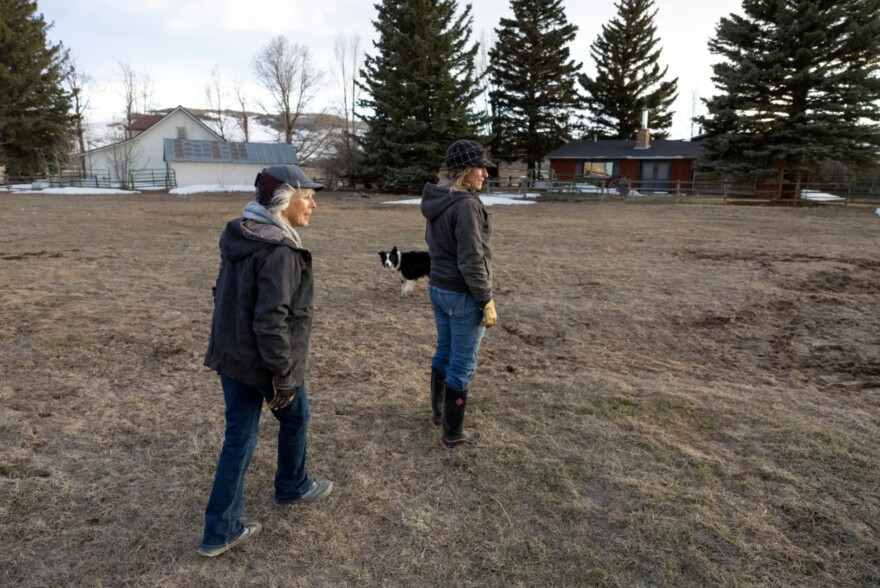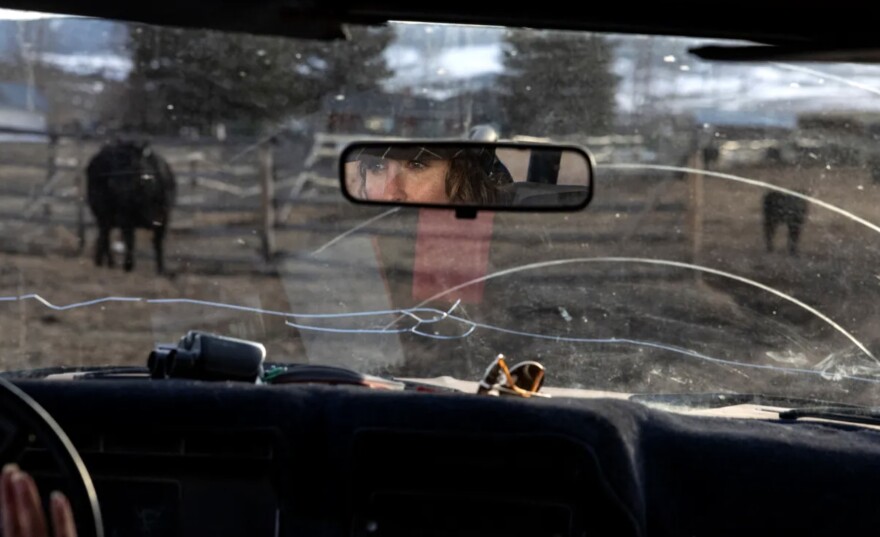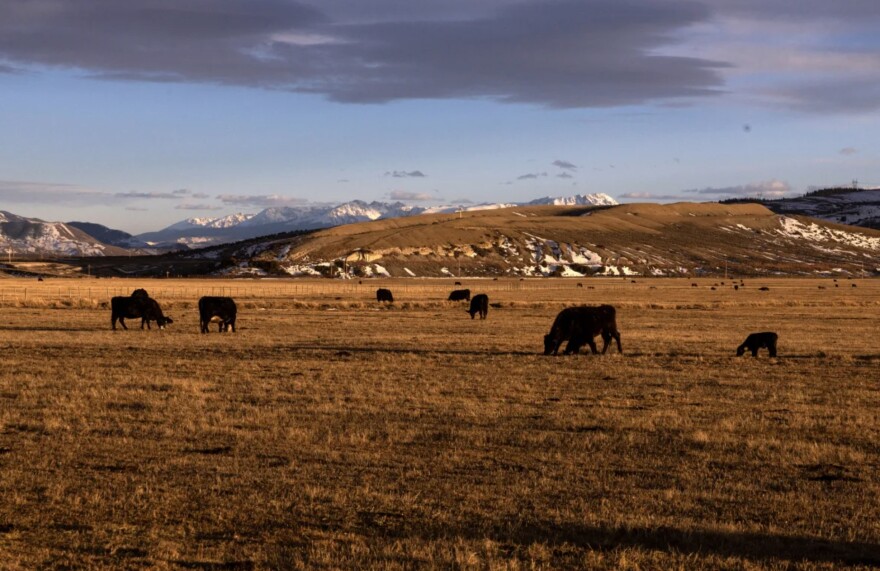The Colorado Sun originally published this story at 4:00 AM on April 22, 2024.
San Luis Valley cattle rancher George Whitten was halfway through a mental health workshop when he let himself tally up a figure he had never wanted to know — the number of people in his life who had died by suicide.
It was eight.
“You just sort of file that away in a gray box, a place in your mind that it’s there, but it’s not something you want to revisit,” said Whitten, who is 71 and runs 150 cows on land outside Saguache that has been in his family for 140 years. “There’s still a lot there that I really haven’t unpacked.”
All eight of those relatives and friends were from the rural, agricultural community, starting with Whitten’s cousin, who died at 18 after he was sent from the family’s ranch to Brigham Young University. The young man was depressed and wanted to come home, but his father told him to stick it out. Then he went missing.
Seven years later, his body was found in a cave next to a pistol.
“For all those seven years,” Whitten said, “we were waiting for him to come driving in.”
The workshop Whitten attended in February was the inaugural Buck the Trend, a therapist-led, two-day session in Mancos for ranchers, farmers, and horse people to dig into their mental health struggles. It’s one of the latest ideas — along with new grants for rural counties and at least two pieces of legislation at the state Capitol this session — to address an alarming rise in the suicide rate in ag communities.
Nationally, the suicide rate for people in the agriculture industry is 3.5 times higher than other professions. Farmers and ranchers are dying at higher rates than the general population in Colorado, too, in a state that has one of the highest suicide rates in the country.
In the five years from 2018 to 2022, there were 102 suicides among people whose careers are in agriculture, forestry, fishing, or hunting, according to the Colorado Department of Public Health and Environment. That’s the fourth-highest rate among all occupations tracked by the department, behind construction workers, mining and oil workers, and managers of companies.
It’s the isolation, the stress of debt and drought and crop-eating pests, and the “cowboy up” mentality that talking about feelings or asking for help is weak.
Maddy Butcher, a horsewoman, author, and founder of Nicker News, created the workshop in the hopes of sparking conversation about a topic that’s hard for many people to talk about particularly rural, ranching types. The community is built on isolation and stoicism, on sucking it up when things get hard, she said. And there is a lack of skills “around how to deal with your own well-being or somebody else’s crisis.”
That first hit Butcher, who lives in Dolores in southwestern Colorado, in 2017, when a well-liked and accomplished Wyoming horse trainer shot himself beside a highway. Peter Campbell’s death rocked the horse community across the country, where he was known as a horse whisperer.

Butcher, a freelance writer, was hired by a horse magazine to write about Campbell’s death — and then was shocked when the editor would not let her say how he died.
“It was a missed opportunity to elevate the conversation about mental health,” Butcher said.
Instead, Butcher wrote what actually happened on her horse blog, eliciting comments from readers who debated whether she should have revealed that it was suicide. One reader told her it was in “poor taste” and disrespectful to Campbell’s family. Another speculated that the only way Campbell would end his life is if he were terminally ill and didn’t “want to be a burden.”
That was only six years ago, before the COVID pandemic that exacerbated the mental health crisis and before many people were paying attention to suicide rates in rural communities.
The stigma and shame of suicide have lifted some since then, but it’s still particularly tough in the ranching world. Butcher grew up in Maine among lobster harvesters, where the culture was similar in some ways to rural Colorado, she said.
“I was one of those people — chin up, soldier on,” Butcher said. “It works until it doesn’t.”
“Don’t air your dirty laundry”
Caitlyn Taussig, who runs a cattle ranch outside of Kremmling with her 76-year-old mother, attended Buck the Trend after going through depression spurred by a breakup with a boyfriend.
For her, one of the most memorable parts of the workshop was an exercise involving colorful sticky notes stuck to squares of butcher paper.
The pieces of white paper contained common sayings, and the participants were instructed to place a green sticky note on words that resonated with their upbringing, an orange sticky note if they recalled hearing the saying occasionally, and a red one if the saying wasn’t part of their life.

At the end of the exercise, a smattering of green sticky notes covered the butcher paper with this phrase: “Don’t air your dirty laundry.”
They had all been told to keep their troubles to themselves, Taussig realized.
At 38, Taussig is part of the generation that she believes has an easier time expressing feelings than the one before it. It helps, too, that she’s a musician and expresses her emotions through songs on the guitar. But when Taussig went through a breakup, or as she put it, “got dumped,” she felt depressed and alone.
Her relationship falling apart added sadness on top of an already high level of daily stress that comes with running a ranch with about 260 cows and calves. There’s the stress of knowing her mom is getting older and won’t be able to keep helping her forever. And the general feeling that the rest of Colorado doesn’t understand or care about farmers and ranchers.
“Sometimes it feels like things are against us,” she said. “Cattle getting blamed for a big percentage of global warming. Wolf reintroduction. The stresses are on us a lot.”
After the breakup, Taussig went to therapy for the first time in her life. It was a hard step. “I felt like a damaged person when I had to go to therapy,” she said. “Then you realize that you’re not alone.”
Taussig said she signed up for the workshop for “selfish” reasons — she thought it would help her better cope with mental health struggles. She noticed the first day, though, that most of the 15 or so people in attendance said they were there so they could take new skills back to their communities.
At first, she wondered, “Is that your safe way of saying you, yourself, don’t struggle?” And she felt bad that she didn’t have intentions of sharing her new mental health skills with others.
But within weeks of the event, Taussig realized she was spreading awareness without even trying. She posted about Buck the Trend on social media and heard from several people who wanted to know more.
Now, she’s working with an event organizer who wants to include a mental health booth at, of all places, a ranching dog competition.

Legislature considers two bills for rural behavioral health
Two bills this legislative session would pour state money into suicide prevention in rural counties — one through the Behavioral Health Administration and the other through the Department of Agriculture.
Senate Bill 55 from Sen. Perry Will, a Republican from New Castle, proposed to create an agricultural liaison within the state Behavioral Health Administration who would oversee a training program for mental health providers who work with farmers and ranchers. The legislation also would create a work group to improve access to mental health care in rural communities. The workgroup would collect data on how programs are working, then report to the legislature annually.
The measure, which would cost an estimated $755,000 each year to pay for staff and fund grants for rural communities, has been hung up in the Senate Appropriations Committee for more than two months as the legislature works out next year’s budget.
A second bill, with a $300,000 price tag and also awaiting a decision from the appropriations committee, calls for a mental health and suicide prevention program within the state Department of Agriculture. Senate Bill 57, from Sen. Tom Sullivan, a Centennial Democrat, would require the new program to conduct a public awareness campaign targeted toward agricultural workers and make sure farmers and ranchers who call a crisis hotline would connect with counselors who understand agricultural issues.
That legislation had a contentious hearing, passing on a 5-3 vote, after questions about why Sullivan wanted to create another crisis line separate from the national 988 crisis hotline.
Rocky Mountain Farmers Union government relations director Tyler Garrett said it made more sense to train workers who answer 988 calls than start another crisis line. “We would be happy to set up things like farm tours, so they can actually be on a farm or ranch, see what it looks like, see the day-to-day aspects that someone faces that lead to this stress,” he testified.
Others were irritated by the mention of guns in Sullivan’s legislation, calling it a hidden agenda to chip away at the rights of gun owners. The bill doesn’t include any proposed changes to gun law but points out that firearms are used in more than half of suicides and that “the presence of guns in a household increases the risk of suicide.”
Suicide rates have been rising faster in rural America than in cities for two decades, increasing by 46% in rural counties compared with 27% in urban areas from 2000-2020, the legislation says.
The Office of Suicide Prevention, which is part of the state health department, is also working to help the agricultural community. A state-funded program in La Plata and Montezuma counties trains local community members in mental health prevention. About 75 people were trained through the program last year.
The office used a federal grant this spring to hire a “rural strategies specialist” who works in rural Colorado and is charged with producing new ideas to prevent suicide.

“Comes like the flu”
Whitten, in Saguache, was appointed to the Colorado Agricultural Commission about five years ago. As he headed to his first meeting, he had expected to talk about how to attract the next generation that will raise livestock and grow food.
Instead, the meeting included a presentation on mental health and suicide. “It just really shocked me,” Whitten recalled.
Whitten is now a regional assistant commissioner with the Colorado Department of Agriculture, where mental health is a top-of-mind topic.
“It’s really sad what happens to people,” he said. “They get caught in that production, debt, technology trap. There’s drought. There’s pestilence. The public perception of farming. Land ownership and ranching and farming is a wonderful way to live, but it’s also really hard. You’re responsible for a lot of things, a lot of lives.”
Now, as he begins to figure out who will keep his grass-fed beef operation alive when he’s gone, Whitten has hired a therapist to talk to his whole ranching team, including his children and employees. It’s a complex decision, with questions about whether one child would have to buy out the others to keep the ranch and whether the children of employees could take on the operation. Over the past 100 years, divorce, death, and disagreements have all chipped away at the land, he said.
Whitten’s had a happy life, but he’s dealt with depression, too. He once tried to talk to a therapist but couldn’t get an appointment for a month — “which could be a life,” he said.
“Depression is a thing that comes like the flu,” Whitten said. “You can’t really just say, ‘I’m going to get over this and I’ll take a deep breath and I’ll be OK.’”






